Background
Ellen Lewin was born on January 19, 1946, in Brooklyn, New York, United States. She is the daughter of Joseph D. and Fannie (Slotkin) Lewin.











(This pioneering collection of essays explores some of the...)
This pioneering collection of essays explores some of the many and varied ways that women might use a particular idea of being lesbian to invent themselves, to understand how they are connected in the world, and to imagine notions of community. Focused through an anthropological lens, contributors explore a wide range of expressions that bind different lesbian communities together—from dance club culture to lesbian wedding ceremonies, from lesbian life in the 1920s to lesbian motherhood today. As a whole, Inventing Lesbian Cultures in America shows how communities and identities allow for a sense of collective meaning for lesbians today. Defined in terms of culture, the activities, alliances, and identities that make up the experience of being lesbian imbue their lives with dignity and stability. Inventing Lesbian Cultures in America will become required reading for anyone interested in gender and sexual identity.
http://www.amazon.com/gp/product/080707943X/?tag=2022091-20
1996
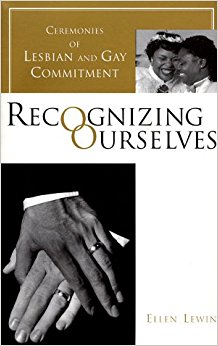
(In April 1993, as part of the March on Washington for Les...)
In April 1993, as part of the March on Washington for Lesbian, Gay, and Bi Equal Rights and Liberation, hundreds of couples participated in "the Wedding," a symbolic commitment ceremony held in front of the Internal Revenue Service building. Part protest and part affirmation of devotion, the event was a reminder that marriage rights have become a major issue among lesbians and gay men, who cannot marry legally and can only claim domestic partner rights in a few locations in the United States. Yet despite official lack of recognition, same-sex wedding ceremonies have been increasing in frequency over the past decade. Ellen Lewin, who has consecrated her own lesbian relationship with a commitment ceremony, decided to explore the myriad ways in which lesbians and gay men create meaningful ceremonies for themselves. She offers the first comprehensive account of lesbian and gay weddings in modern America. A series of richly detailed profiles―the result of extensive interviews and participation in the planning and realization of many of these commitment rituals―is woven together to show how new traditions, and ultimately new families, are emerging within contemporary America. Just as the book is a moving portrait of same-sex couples today, it is also a significant political document on a new arena in the struggle for lesbian and gay rights. In a larger sense, Lewin's work is about the politics surrounding same-sex marriages and the ramifications for central dimensions of American culture such as kinship, community, morality, and love. Lewin explores the ceremonies themselves, which range from traditional church weddings to Wicca rituals in the countryside, with portraits of the planning, the joys, and the anxieties that led up to the weddings. She introduces Bob and Mark, a leather fetishist couple who sanctified their love by legally changing their last names and exchanging vows in tuxedos, leather bow ties, and knee-high police boots. In an equally absorbing profile, Lewin describes Khadija, from a working-class black family deeply suspicious of whites (and especially Jews) and Shulamith, raised in a Zionist household. She tells of how the two women struggled to reconcile their widely disparate upbringings and how they ultimately combined elements of African and Jewish traditions in their wedding. These, among many other stories, make Recognizing Ourselves a vivid tapestry of lesbian and gay life in post-Stonewall United States.
http://www.amazon.com/gp/product/023110393X/?tag=2022091-20
1999
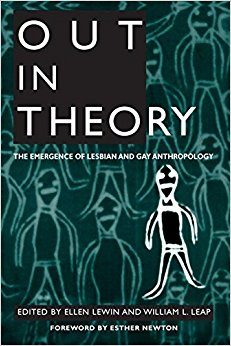
(A companion volume to Out in the Field, a benchmark exami...)
A companion volume to Out in the Field, a benchmark examination of lesbian and gay experiences in anthropology, Out in Theory presents lesbian and gay anthropology as a distinct specialization and addresses the theoretical issues that define the emerging field. This compelling collection of essays details the scholarly and personal factors that affected the emergence of lesbian and gay anthropology and speculates on the directions it will take as it continues to grow and diversify. Seeking to legitimize the field's scholarship and address issues in terminology, the essays also define the lesbian and gay anthropology's scope and subject matter and locate factors that separate it from the wider concerns of the profession. Specific essays track the emergence of lesbian and gay studies in social and cultural anthropology, linguistics, archaeology, and in various areas of anthropological activism. They also consider how feminist anthropology helped define the field and how transgendered experience, queer theory, and race and class studies are promoting new directions of inquiry within lesbian and gay anthropology.
http://www.amazon.com/gp/product/0252070763/?tag=2022091-20
2002
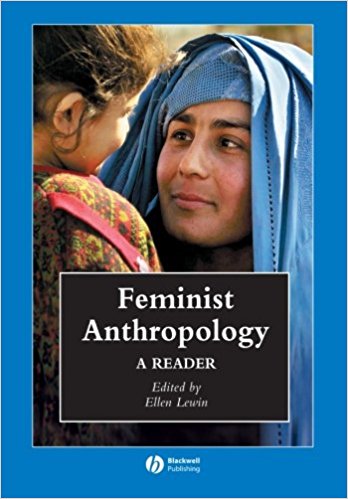
(Feminist Anthropology surveys the history of feminist ant...)
Feminist Anthropology surveys the history of feminist anthropology and offers students and scholars a fascinating collection of both classic and contemporary articles, grouped to highlight key themes from the past and present. Offers vibrant examples of feminist ethnographic work rather than synthetic overviews of the field. Each section is framed by a theoretical and bibliographic essay. Includes a thoughtful introduction to the volume that provides context and discusses the intellectual “foremothers” of the field, including Margaret Mead, Ruth Landes, Phyllis Kaberry, and Zora Neale Hurston.
http://www.amazon.com/gp/product/1405101962/?tag=2022091-20
2006
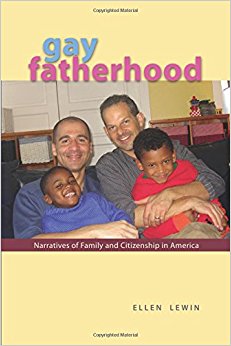
(Men are often thought to have less interest in parenting ...)
Men are often thought to have less interest in parenting than women, and gay men are generally assumed to prefer pleasure over responsibility. The toxic combination of these two stereotypical views has led to a lack of serious attention being paid to the experiences of gay fathers. But the truth is that more and more gay men are setting out to become parents and succeeding—and Gay Fatherhood aims to tell their stories. Ellen Lewin takes as her focus people who undertake the difficult process of becoming fathers as gay men, rather than having become fathers while married to women. These men face unique challenges in their quest for fatherhood, negotiating specific bureaucratic and financial conditions as they pursue adoption or surrogacy and juggling questions about their future child’s race, age, sex, and health. Gay Fatherhood chronicles the lives of these men, exploring how they cope with political attacks from both the "family values" right and the "radical queer" left—while also shedding light on the evolving meanings of family in twenty-first-century America. Men are often thought to have less interest in parenting than women, and gay men are generally assumed to prefer pleasure over responsibility. The toxic combination of these two stereotypical views has led to a lack of serious attention being paid to the experiences of gay fathers. But the truth is that more and more gay men are setting out to become parents and succeeding—and Gay Fatherhood aims to tell their stories. Ellen Lewin takes as her focus people who undertake the difficult process of becoming fathers as gay men, rather than having become fathers while married to women. These men face unique challenges in their quest for fatherhood, negotiating specific bureaucratic and financial conditions as they pursue adoption or surrogacy and juggling questions about their future child’s race, age, sex, and health. Gay Fatherhood chronicles the lives of these men, exploring how they cope with political attacks from both the "family values" right and the "radical queer" left—while also shedding light on the evolving meanings of family in twenty-first-century America. Men are often thought to have less interest in parenting than women, and gay men are generally assumed to prefer pleasure over responsibility. The toxic combination of these two stereotypical views has led to a lack of serious attention being paid to the experiences of gay fathers. But the truth is that more and more gay men are setting out to become parents and succeeding—and Gay Fatherhood aims to tell their stories. Ellen Lewin takes as her focus people who undertake the difficult process of becoming fathers as gay men, rather than having become fathers while married to women. These men face unique challenges in their quest for fatherhood, negotiating specific bureaucratic and financial conditions as they pursue adoption or surrogacy and juggling questions about their future child’s race, age, sex, and health. Gay Fatherhood chronicles the lives of these men, exploring how they cope with political attacks from both the "family values" right and the "radical queer" left—while also shedding light on the evolving meanings of family in twenty-first-century America.
http://www.amazon.com/gp/product/0226476588/?tag=2022091-20
2009
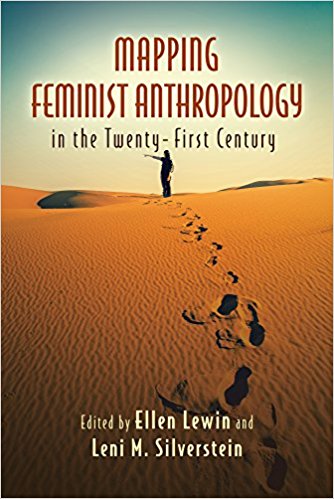
(Feminist anthropology emerged in the 1970s as a much-need...)
Feminist anthropology emerged in the 1970s as a much-needed corrective to the discipline’s androcentric biases. Far from being a marginalized subfield, it has been at the forefront of developments that have revolutionized not only anthropology, but also a host of other disciplines. This landmark collection of essays provides a contemporary overview of feminist anthropology’s historical and theoretical origins, the transformations it has undergone, and the vital contributions it continues to make to cutting-edge scholarship. Mapping Feminist Anthropology in the Twenty-First Century brings together a variety of contributors, giving a voice to both younger researchers and pioneering scholars who offer insider perspectives on the field’s foundational moments. Some chapters reveal how the rise of feminist anthropology shaped—and was shaped by—the emergence of fields like women’s studies, black and Latina studies, and LGBTQ studies. Others consider how feminist anthropologists are helping to frame the direction of developing disciplines like masculinity studies, affect theory, and science and technology studies. Spanning the globe—from India to Canada, from Vietnam to Peru—Mapping Feminist Anthropology in the Twenty-First Century reveals the important role that feminist anthropologists have played in worldwide campaigns against human rights abuses, domestic violence, and environmental degradation. It also celebrates the work they have done closer to home, helping to explode the developed world’s preconceptions about sex, gender, and sexuality. Feminist anthropology emerged in the 1970s as a much-needed corrective to the discipline’s androcentric biases. Far from being a marginalized subfield, it has been at the forefront of developments that have revolutionized not only anthropology, but also a host of other disciplines. This landmark collection of essays provides a contemporary overview of feminist anthropology’s historical and theoretical origins, the transformations it has undergone, and the vital contributions it continues to make to cutting-edge scholarship. Mapping Feminist Anthropology in the Twenty-First Century brings together a variety of contributors, giving a voice to both younger researchers and pioneering scholars who offer insider perspectives on the field’s foundational moments. Some chapters reveal how the rise of feminist anthropology shaped—and was shaped by—the emergence of fields like women’s studies, black and Latina studies, and LGBTQ studies. Others consider how feminist anthropologists are helping to frame the direction of developing disciplines like masculinity studies, affect theory, and science and technology studies. Spanning the globe—from India to Canada, from Vietnam to Peru—Mapping Feminist Anthropology in the Twenty-First Century reveals the important role that feminist anthropologists have played in worldwide campaigns against human rights abuses, domestic violence, and environmental degradation. It also celebrates the work they have done closer to home, helping to explode the developed world’s preconceptions about sex, gender, and sexuality.
http://www.amazon.com/gp/product/0813574285/?tag=2022091-20
2016
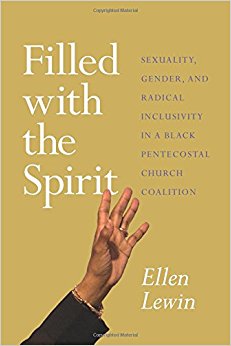
(In 2001, a collection of open and affirming churches with...)
In 2001, a collection of open and affirming churches with predominantly African American membership and a Pentecostal style of worship formed a radically new coalition. The group, known now as the Fellowship of Affirming Ministries or TFAM, has at its core the idea of “radical inclusivity”: the powerful assertion that everyone, no matter how seemingly flawed or corrupted, has holiness within. Whether you are LGBT, have HIV/AIDS, have been in prison, abuse drugs or alcohol, are homeless, or are otherwise compromised and marginalized, TFAM tells its people, you are one of God’s creations. In Filled with the Spirit, Ellen Lewin gives us a deeply empathetic ethnography of the worship and community central to TFAM, telling the story of how the doctrine of radical inclusivity has expanded beyond those it originally sought to serve to encompass people of all races, genders, sexualities, and religious backgrounds. Lewin examines the seemingly paradoxical relationship between TFAM and traditional black churches, focusing on how congregations and individual members reclaim the worship practices of these churches and simultaneously challenge their authority. The book looks closely at how TFAM worship is legitimated and enhanced by its use of gospel music and considers the images of food and African American culture that are central to liturgical imagery, as well as how understandings of personal authenticity tie into the desire to be filled with the Holy Spirit. Throughout, Lewin takes up what has been mostly missing from our discussions of race, gender, and sexuality—close attention to spirituality and faith. In 2001, a collection of open and affirming churches with predominantly African American membership and a Pentecostal style of worship formed a radically new coalition. The group, known now as the Fellowship of Affirming Ministries or TFAM, has at its core the idea of “radical inclusivity”: the powerful assertion that everyone, no matter how seemingly flawed or corrupted, has holiness within. Whether you are LGBT, have HIV/AIDS, have been in prison, abuse drugs or alcohol, are homeless, or are otherwise compromised and marginalized, TFAM tells its people, you are one of God’s creations. In Filled with the Spirit, Ellen Lewin gives us a deeply empathetic ethnography of the worship and community central to TFAM, telling the story of how the doctrine of radical inclusivity has expanded beyond those it originally sought to serve to encompass people of all races, genders, sexualities, and religious backgrounds. Lewin examines the seemingly paradoxical relationship between TFAM and traditional black churches, focusing on how congregations and individual members reclaim the worship practices of these churches and simultaneously challenge their authority. The book looks closely at how TFAM worship is legitimated and enhanced by its use of gospel music and considers the images of food and African American culture that are central to liturgical imagery, as well as how understandings of personal authenticity tie into the desire to be filled with the Holy Spirit. Throughout, Lewin takes up what has been mostly missing from our discussions of race, gender, and sexuality—close attention to spirituality and faith.
http://www.amazon.com/gp/product/022653720X/?tag=2022091-20
2018
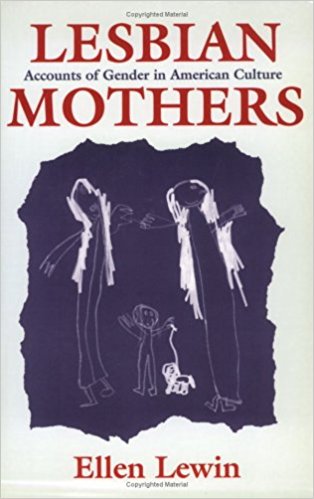
(Within a society that long considered "lesbian motherhood...)
Within a society that long considered "lesbian motherhood" a contradiction in terms, what were the experiences of lesbian mothers at the end of the twentieth century? In this illuminating book, lesbian mothers tell their stories of how they became mothers; how they see their relationships with their children, relatives, lovers, and friends and with their children’s fathers and sperm donors; how they manage child-care arrangements and financial difficulties; and how they deal with threats to custody. Ellen Lewin’s unprecedented research on lesbian mothers in the San Francisco area captured a vivid portrait of the moment before gay and lesbian parenting moved into the mainstream of U.S. culture. Drawing on interviews with 135 women, Lewin provided her readers with a new understanding of the attitudes of individual women, the choices they made, and the texture of their daily lives.
http://www.amazon.com/gp/product/080148099X/?tag=2022091-20
2018
anthropologist educator author
Ellen Lewin was born on January 19, 1946, in Brooklyn, New York, United States. She is the daughter of Joseph D. and Fannie (Slotkin) Lewin.
Ellen Lewin received her Bachelors of Arts degree in 1967 for linguistics from the College of the University of Chicago. She went on to obtain her Master of Arts degree in Anthropology in 1968 and later her doctorate in Anthropology in 1975 at Stanford University.
Lewin started her career as a research technician in acoustical linguistics at Haskins Laboratories in New York City in 1967. After graduating from Stanford University, she started working as an instructor in anthropology there. Three years later she went to University of California in Davis, where she worked as a lecturer in anthropology. However, the next year she decided to work at the University of California in San Francisco. Lewin started there from the position of research anthropologist in 1975, and in 1981, she was a member of executive committee.
Since 1983 till 1984, Lewin worked as a co-director of Center for Women, Health, and Healing. After leaving the University of California in San Francisco in 1986, she became an associate professor of sociology and criminal justice and director of Women’s Studies Program at Old Dominion University in Norfolk. Two years later, she returned to California, where she started working as a visiting associate professor and lecturer of women's studies at the University of California at Berkeley.
Since 1994, Lewin worked as an affiliated scholar at Institute for Research on Women and Gender at Stanford University. In three years, she went to the University of Iowa, where she started as an associate professor of Women’s Studies Program and Department of Anthropology. Since 1999, Lewin is a professor of Departments of Women’s Studies and Anthropology at the University of Iowa.
Since that time, she was also a lecturer at different educational institutions, including University of Akron, University of Arizona, American University, New School for Social Research, University of Chicago, University of Nevada, Michigan State University, and Cornell University.
Lewin is best known as an anthropologist, whose works focus on areas of motherhood, sexuality, and reproduction in her academic studies and ethnographic research of feminist and medical anthropology.
Over the course of her career, she has completed studies that focus on low-income Latina immigrants in San Francisco, lesbian mothers, lesbian and gay commitment ceremonies in the US, and gay fathers.
Lewin is a recipient of various grants and fellowships.
(Within a society that long considered "lesbian motherhood...)
2018(A companion volume to Out in the Field, a benchmark exami...)
2002(This pioneering collection of essays explores some of the...)
1996(In April 1993, as part of the March on Washington for Les...)
1999(Feminist Anthropology surveys the history of feminist ant...)
2006(In 2001, a collection of open and affirming churches with...)
2018(Men are often thought to have less interest in parenting ...)
2009(Feminist anthropology emerged in the 1970s as a much-need...)
2016Lewin is a member of the American Anthropological Association, American Ethnological Society, Association for Feminist Anthropology and Society of Lesbian and Gay Anthropologists.
Lewin is not married, but lives with a companion, Lizabeth Goodman.
